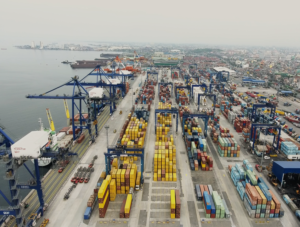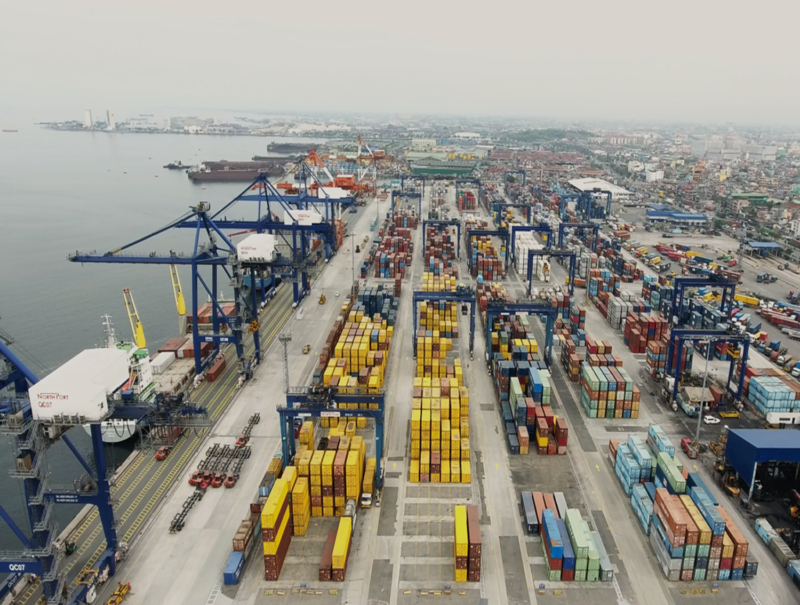
A broad sector of industry groups is asking the Philippine Ports Authority (PPA) to suspend implementation of a policy requiring shipping lines to use quay cranes and pay cranage fees at the Manila North Harbor domestic terminal.
In a letter to PPA general manager Jay Daniel Santiago, the groups said they “take exception” to the policy by Manila North Harbour Port, Inc. (MNHPI) “imposing the use of its quay cranes on all shipments going through the port, and applying a cranage fee of PHP 1,587.00 on these shipments, effecting 22 June 2020.”
READ: Container ships calling North Port must use Terminal 1 from June 22
Santiago is also chairman of the Shippers’ Protection Office (SPO), a recently established office under PPA that handles shippers’ complaints against domestic and international shipping lines.
The industry groups include Philippine Exporters Confederation, Inc.; Philippine Chamber of Commerce and Industry; Supply Chain Management Association of the Philippines; Federation of Philippine Industries; Philippine Multimodal Transport and Logistics Association, Inc.; United Portusers Confederation of the Philippines, Inc.; Alyansa Agrikultura; American Chamber of Commerce of the Philippines, Inc.; and Association of Off-Dock CFS Operators of the Philippines, Inc.
Also part of the group are the Chamber of Customs Brokers, Inc.; Confederation of Truckers Association of the Philippines, Inc.; European Chamber of Commerce of the Philippines; Philippine Association of Multinational Companies Regional Headquarters, Inc.; and Professional Customs Brokers Association.
MNHPI, operator of domestic terminal North Port at Manila North Harbor, issued an advisory on June 8 requiring all domestic container vessels to berth at Terminal 1 from June 22. This means such vessels must use quay cranes and pay cranage fees.
No need for cranes
Previously, domestic ships calling North Port could opt to use lift-on/lift-off (Lo-Lo) berths served by gangs, a group of cargo workers employed by stevedoring companies to work the ships.
Since only Manila, Cebu and Cagayan de Oro are equipped with quay cranes, most domestic ships are fitted with their own gears to allow them to unload cargo through Lo-Lo without the need for quay cranes.
The groups further noted that it is more cost-effective for domestic ships to use their own gears rather than quay cranes in loading and unloading cargo.
“The use of quay cranes reduced the use of these stevedores by around half, but the potential savings to shipping lines are not realized, as stevedores would still be required in other ports, and also as payment of cranage fee to MNHPI is mandated to be paid before any cargo is handled,” they explained.
In addition, shipping lines do not charge the cost of Lo-Lo as part of their value proposition to clients, and the policy “prevents shipping lines from providing value to its clients,” they further said.
“It is redundant and duplicating what the shipping lines are already offering and shippers are surely paying for already.”
The groups said that with the cranage fee set at P1,587—in addition to the arrastre fee of P1,575—cargo handling costs have effectively doubled when the policy was implemented.
“These costs impact directly on logistics cost that will eventually be borne by the consumers,” they said.
The groups added that they support the government’s port modernization initiatives, “but if such will only result in more charges and increasing the cost of logistics without improving the efficiency and productivity, it defeats the main purpose of ‘modernization’.”
Delays observed
In addition, as some shipping lines have started to use the quay cranes at MNHPI, the groups have noted delays, with some ships reporting up to two days of queuing before being able to unload their shipments.
Prior to implementation of the policy, the groups claimed to have experienced no delays in handling of their cargoes. But when the policy was implemented on June 22, cargo unloading encountered five to seven days of delay, they claimed.
“PPA, however, claims that delays were reduced to 2-3 days. But we have reasons to believe that by allowing vessels to dock at any available berth for loading and unloading using her own ship’s gear [this] would not only eliminate waiting time but reduce cost in its operations,” they said.
And while the quay cranes can admittedly ensure the faster turnaround of ships, the groups argued “the quay cranes already installed at MNHPI are not sufficient to improve cargo handling capacity and do not provide any value-added since the queue before unloading takes up to two (2) days.”
They added that MNHPI “does not have enough quay cranes and/or berths to accommodate the ships that come in and out of the port.”
“It can also be argued that the policy of forcing all ships to berth in one terminal is leading to unnecessary delays that prevent timely movement of goods, particularly perishables and goods deemed essential in these critical times.”
Philippine Liner Shipping Association (PLSA) president Mark Matthew Parco earlier acknowledged the use of quay cranes could improve productivity and ease the port congestion, but pointed out shipping lines would then be compelled to pass on the cranage cost to customers.
Parco said shipping lines would rather use the cheaper option provided by Lo-Lo berths to conserve needed cash after cargo volumes dropped by 70% due to the coronavirus (COVID-19) pandemic.
The groups are recommending putting the policy’s implementation on hold until a Regulatory Impact Assessment (RIA) can be undertaken as mandated under Republic Act 11032, otherwise known as the Ease of Doing Business and Effective Government Service Delivery Act of 2018.
They said the result of the RIA must also be reviewed and approved by the Anti-Red Tape Authority (ARTA) in consideration of the government’s regulatory forbearance policy to mitigate the impact of the COVID-19 pandemic on the economy and cost of doing business.
ARTA had earlier asked PPA to comment on having allowed MNHPI to implement a new guideline for berthing at North Port “without proper consultation with stakeholders.”
PPA, however, had said no prior public consultation was needed as the policy was not new and berth management was in MNHPI’s management contract.
READ: Prior public consult unnecessary to implement MNHPI berthing rule, says PPA
MNHPI general manager Romeo Salvador earlier told PortCalls the policy was in “compliance to government regulations on strict social/physical distancing while ensuring the unhampered delivery of port services.” It was also in line with the port modernization program agreed between PPA and MNHPI. The port operator in 2010 won a 25-year concession to modernize and operate North Port. – Roumina Pablo





